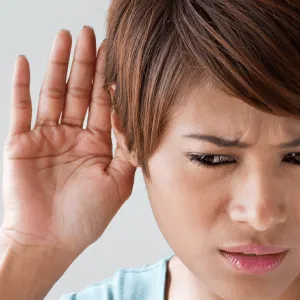
Think you may have the initial signs of hearing loss?
Changes in hearing often occur gradually throughout a lifetime. Many times individuals will compensate for these changes in hearing often without knowing it.
Take the QuizThere are many different causes of hearing loss, a few include:
Hearing loss can be caused by an event or just be a decrease in your ability to hear over time. It can range anywhere from mild to severe and will either be permanent or temporary. Hearing loss is most common in adults but gradual loss of hearing can be found in people of any age. The most common cause of hearing loss is age and exposure to noise.
The Two Types of Hearing Loss - Conductive and Sensorineural
It is easier to understand the two types of hearing loss if you know a little about how the ear is structured. The ear has three parts:
- The Outer Ear includes the Pinna (the visible part of the ear) and the ear canal
- The Middle Ear includes the three ossicle bones, eardrum, and the Eustachian Tube
- The Inner Ear includes the cochlea and the semicircular canals
Think you may be suffering from hearing loss? Take our quiz to find out how bad your hearing is.

Conductive Hearing Loss
Conductive hearing loss occurs when sound is having trouble traveling through the outer and middle ear. You may have a harder time hearing soft sounds and loud sounds may be muffled. Conductive hearing loss can sometimes be cured by medicine or surgery.
In someone without hearing loss, sound is easily passed through the outer and middle ear to the ossicle bones. The ossicle bones then pass the sound to the inner ear. Conductive hearing loss occurs when there is a mechanical problem getting the sound waves through the outer and middle ear to the ossicle bones and into the inner ear.
Causes of Conductive Hearing Loss
- Earwax or foreign object in the ear
- Outer ear infection or inflammation (also called Otitis Externa or Swimmer's Ear)
- Abnormality in the outer ear from trauma or heredity
- Tumors
- Holes or perforation of the eardrum from trauma, pressure or infection
- Middle ear infection or inflammation (Otitis Media)
- Fluid in the middle ear
- Changes in the ossicle bones also known as Otosclerosis

Sensorineural Hearing Loss
Presbycusis or sensorineural hearing loss is the result of damage to the hairs in the cochlea or the auditory nerve which transmits signals to the brain. Unlike conductive hearing loss, sensorineural hearing loss takes place in the inner ear and accounts for 90% of hearing loss. When you have sensorineural hearing loss speech may sound quieter, soft sounds may be harder to hear, some loud sounds may be distorted, and low frequency vowel sounds will be easier to hear than higher pitched sounds.
Causes of Sensorineural Hearing Loss
- Noise Exposure (Most Common)
- Aging(Most Common)
- Diseases such as autoimmune disease of the inner ear, multiple sclerosis, and Meniere’s disease
- Viruses such as mumps, measles, or meningitis
- Drugs that are toxic to hearing
- Hereditary hearing loss
- Congenital conditions like premature birth or malformation of the inner ear
- Trauma to the head or ear
- Excessive loud noise exposure

I think I have hearing loss.
What do I do now?
To correctly diagnose your hearing loss and the causes of it, you should see an ENT specialist. If you have noticed any kind of change in your hearing, do not delay. When it comes to hearing loss, scheduling an appointment as soon as possible is crucial. Dr. Driskill and Dr. Donaldson can identify your hearing loss and create a treatment plan that is right for you.
Schedule Today!